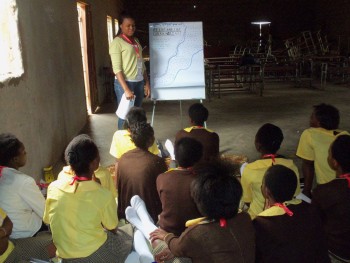Me, You, Together, Build: Helping Zambian girls negotiate better futures
In 2010, when I was role-playing with classmates in a graduate school Negotiations course, I never thought I would soon be facilitating a similar program in a secondary school in Zambia. Instead of topics in business and international affairs, however, the 8th and 9th grade girls we work with role-play conversations with sibl ings about sharing chores so they have more time to study, with parents or guardians about getting money for school fees and supplies, and with friends and boys about responding to pressures to engage in risky behavior. They are part of an IPA pilot program for a randomized evaluation designed by researchers Nava Ashraf, Kathleen McGinn, and Corinne Low to measure the health and educational impacts of certain components of life skills and HIV/AIDS awareness programs for secondary school girls. My work focuses on a customized negotiation skills curriculum with the mantra “Me, You, Together, Build.”
ings about sharing chores so they have more time to study, with parents or guardians about getting money for school fees and supplies, and with friends and boys about responding to pressures to engage in risky behavior. They are part of an IPA pilot program for a randomized evaluation designed by researchers Nava Ashraf, Kathleen McGinn, and Corinne Low to measure the health and educational impacts of certain components of life skills and HIV/AIDS awareness programs for secondary school girls. My work focuses on a customized negotiation skills curriculum with the mantra “Me, You, Together, Build.”
“Me, You, Together, Build” was developed specifically for the Zambian context where teenage girls face much higher HIV rates than boys of their same age and drop out of school at a rate 3 times higher. The power imbalances and lack of resources that girls in focus groups cite facing suggest that simply providing information about the benefits of schooling and risks of HIV/AIDS may not be enough to change girls’ behavior. The negotiation curriculum pulls from the latest in negotiation scholarship, extensive feedback and input from local partners and coaches, and two years of iterative piloting in Zambia; it emphasizes a method of talking to solve problems that aims to leave each person better off. When a girl faces a challenge with another individual, she learns to walk through the steps of “Me, You, Together, Build”:
Me – She thinks more deeply about what her own many and varied interests are and determines what her other option will be if finding a solution with the other person doesn’t end up being possible or in her interest.
You – She remembers to take a step back and find the good in the other person, and she uses communication skills to approach the person in a way which encourages the person to open up and themselves think about and share their deeper interests.
Together – She and the other person can then identify their shared interests and areas of common ground.
Build – She brainstorms solutions to meet the shared and individual interests with the other person, decides what really matters to her, and ticks off her checklist for building a cohesive agreement that both individuals can be happy with.
This negotiation curriculum is taught in small groups by female role models, in combination with a more standard health and education information curriculum. 100 girls participated in a pilot program in Lusaka earlier this year and, as we plan to roll out the full-scale study, it is hard not to be inspired by the personal conviction we see emerging from the girls who participate. If we are able to move the full field evaluation forward, we'll soon have rigorous evidence on the precise impact of this curriculum, and detailed data to assist in designing appropriate programs to promote girls' health and well-being in Zambia and beyond!
You can view and “like” a short video to support the project here.












